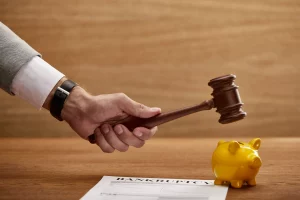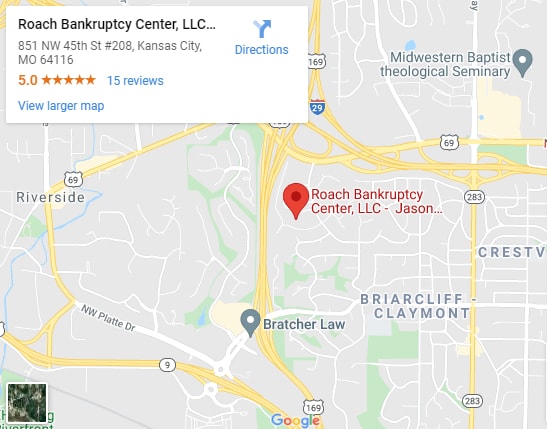Missouri Bankruptcy Attorneys
The legal procedure known as bankruptcy involves the sale of an insolvent debtor’s assets, the division of the proceeds among the debtor’s creditors, and the discharge of the debtor from any further responsibility for the debt. The purpose of bankruptcy is to provide the debtor with a new beginning that is unencumbered by previous obligations and to settle creditor claims in a manner that is fair by allocating the debtor’s remaining assets to the creditors in an equitable manner.
The bankruptcy process can be started by the debtor themselves, which is known as a voluntary bankruptcy, or it can be started by a petition filed by the debtor’s creditors, which is known as an involuntary bankruptcy.
At the Roach Bankruptcy Center, LLC, we have experienced Kansas chapter 7 bankruptcy and chapter 13 bankruptcy attorneys who assist clients in overcoming difficult financial burdens and getting out of difficult financial obligations. We have many years of experience assisting individuals in getting out of challenging financial situations. Make direct contact with one of our consumer bankruptcy lawyers as soon as possible in order to obtain any additional information.
Why do I need a Bankruptcy Attorney in Kansas, MO?
 A bankruptcy attorney is an attorney who advises clients on bankruptcy, drafts legal documents for clients, and represents clients in court. A lawyer must possess a law degree and a license to practice in the state in which he or she will work.
A bankruptcy attorney is an attorney who advises clients on bankruptcy, drafts legal documents for clients, and represents clients in court. A lawyer must possess a law degree and a license to practice in the state in which he or she will work.
As your guide through the bankruptcy procedure, an attorney can advise you on the following:
- Whether to declare bankruptcy or not
- Which kind of bankruptcy must be filed?
- How the bankruptcy process operates
- Which court-issued forms require completion?
- Which debts are eligible for reduction or cancellation?
- Whether you will be able to keep your home, vehicle, and other property following the conclusion of the bankruptcy case.
In general, a bankruptcy attorney can steer you in the right legal direction. If you file for bankruptcy on your own, you may make legal mistakes with long-term financial consequences.
Reasons for Changing from Chapter 7 to Chapter 13
The majority of filers prefer Chapter 7. It quickly eliminates qualifying debt and does not require a Chapter 13 repayment plan, so it’s easy to see why. In spite of this, it may be necessary to convert to Chapter 13 after filing, either voluntarily or by court order.
Conversion by Order of the Court to Chapter 13
If the court determines that you are ineligible to file for Chapter 7, it will order you to convert to Chapter 13. The most frequent cause is an error on the Chapter 7 means test.
The means test is a difficult mathematical calculation used to determine eligibility for a Chapter 7 discharge — an order that eliminates debt. The means test determines if you can afford to make a reasonable monthly payment on your unsecured debts via a repayment plan. If you fail the test, you are not eligible for a Chapter 7 bankruptcy. If you qualify, your most common option will be to convert to Chapter 13 bankruptcy. Not everyone has sufficient income to pay the Chapter 13 debts.
However, the court cannot compel you to remain in a Chapter 13 case. You may request that the court dismiss your case.
Conversion to Chapter 13 by Choice
It may be in your best interest to switch from a Chapter 7 to a Chapter 13 bankruptcy. Your financial situation may have changed since you filed for Chapter 7 protection. You may have realized that you will lose property of value. Or, you may discover that you neglected to disclose a valuable asset or that you cannot discharge a particular debt.
Your financial situation has evolved
If your financial circumstances have changed, such as obtaining a new job with a higher income, you may wish to take advantage of Chapter 13’s benefits. For instance, you can catch up on missed mortgage payments or car loan payments. Chapter 13 provides greater adaptability than Chapter 7. For example, it may be possible to eliminate a second mortgage on a home or reduce the principal on a car loan. In addition, it will assist you in catching up on domestic support obligations, as these obligations must be paid in full through your plan.
Your property is worth more than you initially believed.
If you cannot exempt your property due to an underestimation of its value, you may wish to convert to Chapter 13 because it allows you to retain your property.
You neglected to list a valuable asset by mistake
You may have inadvertently disclosed a valuable asset inadvertently. Perhaps you didn’t believe it was necessary, as in the case of a legal claim against someone’s insurance for a car accident. Even if exemptions do not permit you to keep the insurance proceeds in Chapter 7, you may be able to do so in Chapter 13. Nobody will require you to convert your case if this occurs, but you may have to decide between doing so and losing the asset you failed to disclose in Chapter 7.
You can only discharge a specific debt under Chapter 13
Some debts are only dischargeable in Chapter 13. For instance, if you wish to eliminate money owed as a result of a divorce settlement. Conversion to Chapter 13 permits the discharge of additional debts.
Facing Imminent Foreclosure?
We can help save your home! Even if time is running out, we’ll find a way. Find out how by speaking with our bankruptcy lawyer in Kansas City, Missouri today.
Call Us Today! (816) 454-5555
How to Convert Chapter 7 to Chapter 13
In most courts, it is relatively simple to convert your case. Numerous courts hold that you have the right to convert, even if a creditor or the trustee objects.
You must perform at least the following:
- file a motion requesting permission from the court
- send the motion to your creditors, the trustee, the United States Trustee, and any other interested parties, and
- attend a brief meeting.
If no one opposes your motion, some courts will grant it without a hearing if no opposition is raised. Review the local rules posted on your court’s website or consult an attorney who is familiar with your court’s procedures, as many courts require you to adhere to additional regulations.
Facing Imminent Foreclosure?
We can help save your home! Even if time is running out, we’ll find a way. Find out how by speaking with our bankruptcy lawyer in Kansas City, Missouri today.
Call Us Today! (816) 454-5555
You Deserve One of the Best Bankruptcy Attorneys in Kansas City, Missouri
The bankruptcy law is very complicated, and you need a firm grasp of the bankruptcy code to get through. Remember, you are not alone
To schedule a free initial consultation with Roach Bankruptcy Center, LLC, please visit our website today. We are available weekday evenings and Saturdays by appointment. Each year, we oversee hundreds of Chapter 7 and Chapter 13 bankruptcies. We are able to manage the transition from Chapter 7 to Chapter 13 bankruptcy.
